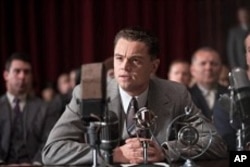Academy award-winning filmmaker Clint Eastwood has teamed up with actor Leonardo DiCaprio on J. Edgar, a biopic of the former FBI head, J.Edgar Hoover, who died in 1972. The film focuses on J.Edgar's controversial personality. It follows him as he made the Federal Bureau of Investigations into one of the country's most powerful agencies and became one of the most powerful political figures of his time.
The plot spans more than 50 years, eight presidencies and three wars. It portrays Hoover as a Macchiavelian figure who believes that the end justifies the means.
He systematically collects information on U.S. citizens and politicians. No one is above suspicion.
J.Edgar: "Do you remember that file we created on his wife?"
Helen Gandy: "Mrs. Roosevelt?"
J.Edgar: "You make a copy for me please?"
Tolson, J.Egar's no.2: "Is that legal?"
J.Edgar: "Sometimes you need to bend the rules a little in order to keep your country safe."
Clint Eastwood some parts of the film are dramatic license. But, he says, much about Hoover's Federal Bureau of Investigation and the power it wielded is corroborated.
"He was a very important figure, the top federal cop, and he probably was the most powerful guy in the country," Eastwood says.
The film alleges Hoover collected information on political figures like President John F. Kennedy, with wire taps.
It shows him using the transcripts as political leverage. Motivated by his fear of communism, Hoover tries to convince Attorney General Robert Kennedy to step up political surveillance of Americans.
Bullying aside, the film portrays Hoover as a public relations expert who mingled in Hollywood and exaggerated his achievements.
But Eastwood also shows him as a visionary, whose forensics led to the arrest of the likes of John Dillinger, a notorious gangster of the 1930s.
And the film digs into Hoover's emotional make up. We see young J. Edgar idolizing his mother, who fuels his ambitions.
The film also addresses rumors about J.Edgar Hoover's sexual orientation.
Hoover's deputy, Clyde Tolson, is shown with the FBI head to the end.
Screenwriter Dustin Lance Black, that after he wrote the screenplay for Milk, about gay activist Harvey Milk, he became intrigued with Hoover.
"I had just done the whole story how coming out of the closet and embracing your nature can give great hope, and I wondered what's the other side of that," Black explains. "And I felt we potentially could benefit from learning and creating this cautionary tale about a man who denied love."
Leonardo DiCaprio offers a daring performance.
"This is an incredibly important American figure to take on," notes DiCaprio, "and so we needed the immense amount of research that Lance had done beforehand and I think he needed my interpretation of how he was going to put that up on the screen."
The actor likes to play controversial figures and he might get an Oscar for this one.
"He probably could," agrees Eastwood. "He is very good. He's an excellent actor. I liked working with him."
The rest of the cast is equally formidable: Judi Dench as the overpowering mother; Naomi Watts as Hoover's steadfast secretary Helen Gandy; and Armie Hammer as Clyde Tolson, balancing the frustration of unrequited love with dignity.
Eastwood depicts Hoover as ruthless, but also patriotic. As for his personal life? It remains shrouded in secrecy like much of the information he amassed.






